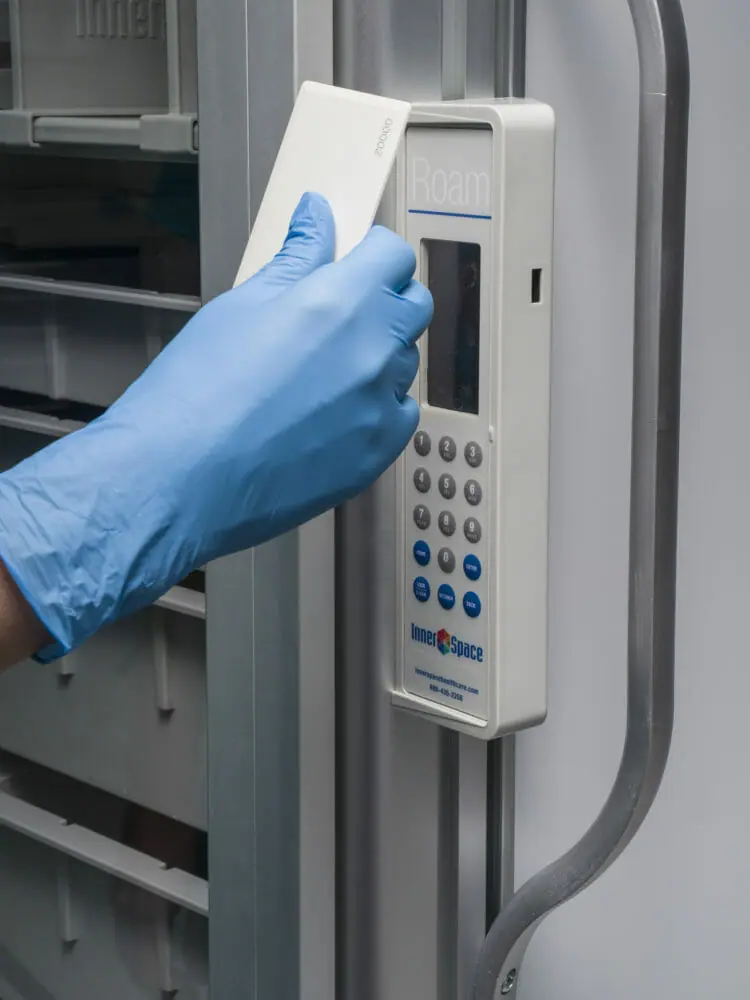Hospital administrators must safeguard their facility’s medications and supplies, as required under state and federal regulations and laws, and protect their assets. Facilities may choose to use locking medication or procedure carts, locking cabinets, or even locked storage rooms.

In the past, a simple keyed lock was the only option available. Many nurses can remember being locked out of the med cart, perhaps when the charge nurse accidentally carried the key to the cafeteria instead of handing it off to a trusted employee at the beginning of her lunch break.
Fast forward to today and supervisors can customize locking carts and cabinets with their choice of high-tech locks. Pharmacies and intensive care areas, such as the OR, PACU, ICU, and ED, are tasked with keeping dangerous medications secure. Yet, these high-stress patient care areas also require fast access to supplies and medications. Choosing locks appropriate for the patient environment increases the security of valuable assets, reduces delays in providing care, results in better patient outcomes, and saves money.
Why Healthcare Facility Security Matters
The Joint Commission (TJC), the largest health care accreditation body in the U.S., sets patient safety standards, including standards for keeping medications secure. Failure to attain or maintain accreditation can affect a facility’s reputation and its ability to maintain contracts with federal health insurance payers.
During an accreditation survey, TJC looks for medication carts that are locked unless they are in active use. Locked medication and supply carts prevent patients, visitors, and unauthorized employees from accessing and appropriating hospital supplies.
Controlled substance diversion by employees is a major concern in the healthcare industry. Health care workers are subject to intense stress and have addiction rates similar to the general public. The data firm, Protenus, reports that 10-15% of healthcare workers abuse drugs. Automatic locking carts may help prevent drug diversion by meeting TJC safety standards for securing medications and allowing administrators to track employee access and the length of time the cart remains unlocked.
The ability to grant access only to employees licensed to administer medications is another reason to secure nursing medication carts with high-tech locks. A combo locking system may prevent medication errors by making it difficult for licensed personnel to request medication administration assistance from non-licensed personnel.
Lock Features to Consider for Medical Supply Carts and Cabinets
Locks for rolling carts and cabinets are available with varying levels of security and accessibility.
Keyed Lock
Pros
- Only employees with a key can open the lock, preventing unauthorized access
Cons:
- Keys can be lost, misplaced, bent, broken, stuck in the lock, or unintentionally left in the lock
- Keys must remain in the unit and transferred to an incoming staff member at the end of each shift
Keypad Lock
Pros:
- Individual codes can be assigned to employees
- Employee access may be trackable
- Codes can be deleted upon employee separation from the facility
Cons:
- Employees must memorize their code
- Risk of code theft if an employee writes code down instead of memorizing
- Not as secure as a combo lock (keypad code and key card)
Key Card Lock
Pros:
- Fast access via an employee badge with RFID technology
- The system tracks employee access
Cons:
- Not as secure as a combo lock (keypad code and key card)
Combo Lock (Keypad and Key Card)
Pros:
- Most secure – employee must possess an RFID badge or key card that matches the keypad code
Cons:
- Slower access due to code input coupled with a badge swipe
Additional Considerations and Features
High-tech locks can provide better security and faster access than the traditional keyed lock but should come equipped with an override feature, such as a key lock to provide manual access in the case of loss of battery power or system outage.
Consider a cart locking system that automatically locks the cart or cabinet after a preset period of inactivity. This ensures that med carts and supply cabinets are not inadvertently left unlocked.
Computer-based systems make it possible to control all aspects of the health care facility’s linked locks. Wifi-enabled locks allow administrators to track and limit user access, and set up notifications for battery status and internet connection issues.
Advanced Medical Lock Systems Save Time and Money
Procedure and medication carts equipped with high-tech locks can help facilities save time when providing life-saving patient care, and protect revenue by making the facility’s assets more secure. Although implementation of new systems in a healthcare facility may seem daunting, the benefits of advanced security systems are worth the effort. InnerSpace offers a variety of secure lock options for medical carts and cabinets, including the high-tech InterConnect Lock System, to keep your medical supplies secure and ensure your facility meets TJC accreditation standards.

Cindy Blye
Content WriterCindy Blye, BSN, RN, CCM is a Registered Nurse and Certified Case Manager. She is an Alumni of West Virginia University School of Nursing (BSN), and a member of the Association of Health Care Journalists and The Authors Guild.
